When towing a trailer or using a hitch-mounted accessory, you need to use a locking hitch pin to secure it.
If you are looking for a new locking hitch pin, it is important to choose the correct size.
The wrong size can cause damage to your vehicle or trailer.
But what size do you need? Keep reading to find out.
What Size Locking Hitch Pin Do I Need?
The size of the locking hitch pin will depend on the size of the hitch receiver on your vehicle and the size of the trailer or accessory you are attaching.
Generally, hitch pins come in 1/2 inch and 5/8 inch sizes.
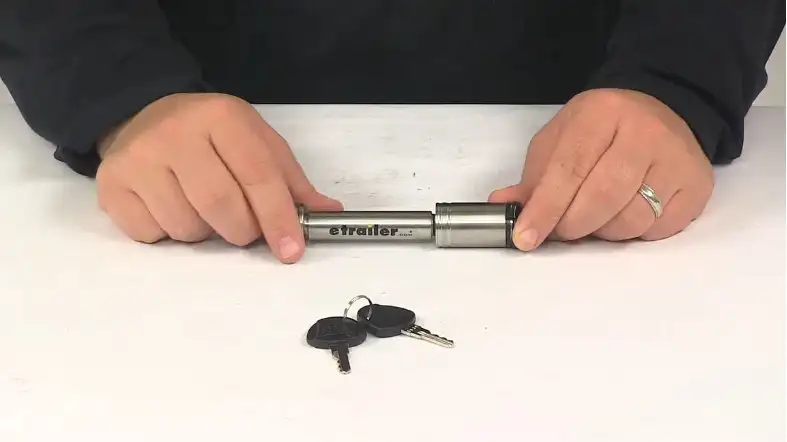
It is important to measure the size of your hitch receiver and choose a locking hitch pin that fits securely and does not allow any play or movement.
This will ensure that the locking hitch pin can properly secure your trailer to your vehicle.
| Hitch Class | Locking Hitch Pin Size | Towing Capacity |
|---|---|---|
| Class I | 1/2 inch | Upto 2,000 pounds |
| Class II | 1/2 inch | Upto 3,500 pounds |
| Class III | 1/2 inch or 5/8 inch | Upto 8,000 pounds |
| Class IV | 5/8 inch | Upto 10,000 pounds |
| Class IV & V | 5/8 inch | Upto 20,000 pounds |
What Are The Types Of Locking Hitch Pins?
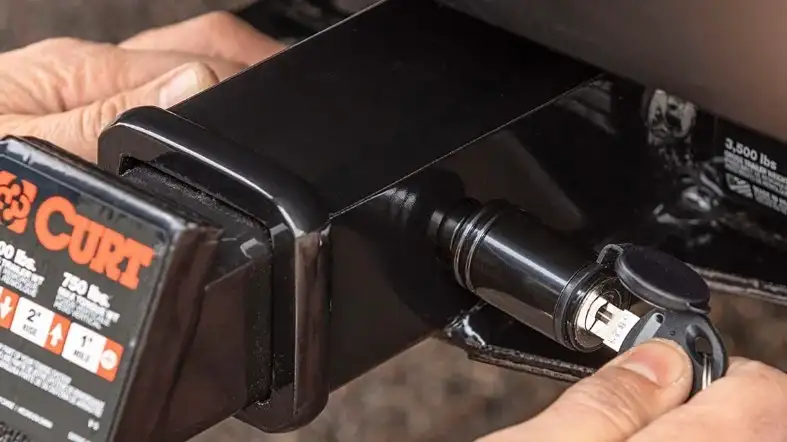
There are mainly 3 types of locking hitch pins available on the market, and the size you need will ultimately depend on your trailer or RV.
The three most common types of locking hitch pins are:
Standard Locking Hitch Pin:
This is the most basic and commonly used type of locking hitch pin.
It is typically made from steel and has a diameter of 5/8 inches.
Heavy Duty Locking Hitch Pin:
This locking hitch pin is designed for heavier trailers and RVs.
It is usually made from stainless steel or another durable material and has a diameter of 1 inch.
Jumbo Locking Hitch Pin:
This is the most significant type of locking hitch pin and is designed for hefty trailers and RVs.
It is usually made from stainless steel or another durable material and has a diameter of 1-1/4 inches.
How To Measure The Correct Size Locking Hitch Pin?
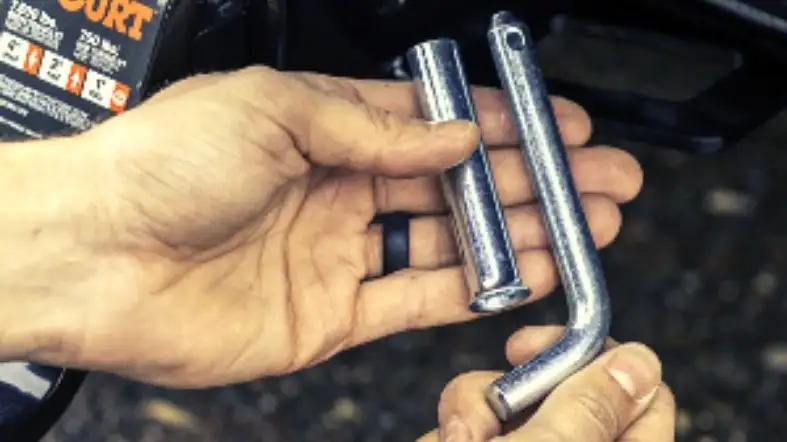
There are a few techniques to measure the correct size locking hitch pin.
The most standard way is to use a tape measure.
Use a ruler or yardstick if you don’t have a tape measure.
Step 1
To measure the length of the pin, start at the top of the pin and measure to the bottom.
To measure the pin’s width, start at one side of the pin and measure to the other side.
Step 2
The diameter of the pin is also important.
The diameter is usually measured in millimeters (mm).
To measure the diameter, start at one side of the pin and measure to the other.
Step 3
You will also need to know the size of your trailer hitch receiver.
The hitch receiver is the part of the trailer hitch that mounts to the vehicle.
The size of the hitch receiver is usually measured in inches.
Step 4
Once you have all of these measurements, you can determine what size locking hitch pin you need.
If you have any questions, you can always ask a local hardware store or auto parts store professional.
They will be able to help you find the right size pin for your needs.
How Do I Choose The Right Size Locking Hitch Pin For My Needs?
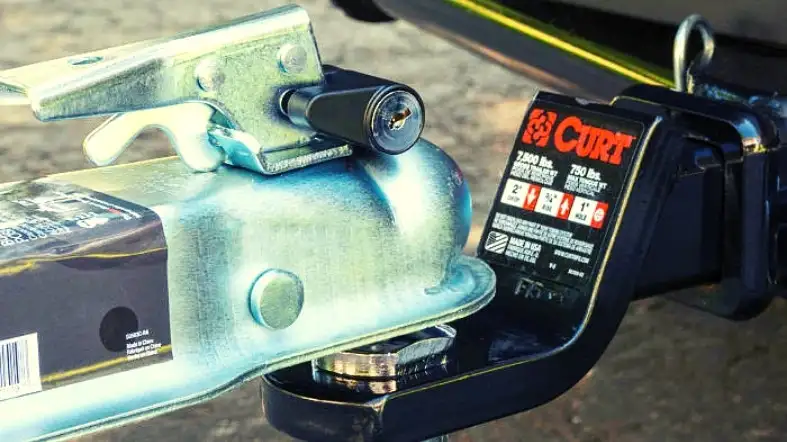
There are a few things to assume when picking the right size locking hitch pin for your needs.
The first is the weight of the trailer tongue.
The second is the height of the trailer coupler. And the third is the length of the locking hitch pin.
Weight of the trailer
The weight of the trailer tongue is the most important factor to consider.
This is because the trailer tongue is what the locking hitch pin will attach to.
If the trailer tongue is too heavy, the locking hitch pin may not hold it.
Weight of the trailer
The height of the trailer coupler is also important to consider.
The height of the coupler will determine how much clearance there is between the bottom of the locking hitch pin and the ground.
If there is insufficient clearance, the locking hitch pin may not be able to engage appropriately with the coupler.
Length of the trailer
The locking hitch pin’s length is also important.
This is because the length of the pin will determine how much engagement there is between the locking hitch pin and the trailer coupler.
If there is not enough engagement, the locking hitch pin may not be able to hold the trailer tongue in place properly.
Size of the trailer
When choosing the right size locking hitch pin for your needs, it is essential to consider all of these factors.
By doing so, you can be sure to choose a pin that will properly hold your trailer tongue in place.
What are the Benefits of a Locking Hitch Pin?
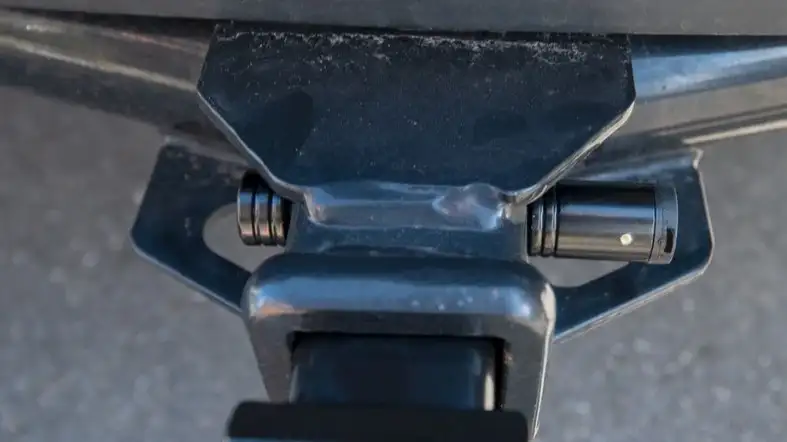
There are many benefits of using a locking hitch pin, including:
Preventing trailer theft
It’s estimated that one in every three trailers is stolen in the United States.
A locking hitch pin can help deter thieves and protect your investment.
Keep your trailer securely attached.
A locking hitch pin can provide an extra layer of security to ensure that your trailer stays put.
This is especially important if you’re transporting valuable or sensitive cargo.
Peace of mind
Locking hitch pins can give you mental peace, knowing that your trailer is secure.
This can be especially important when traveling long distances or in unfamiliar territory.
What Are Some Tips For Using A Locking Hitch Pin?
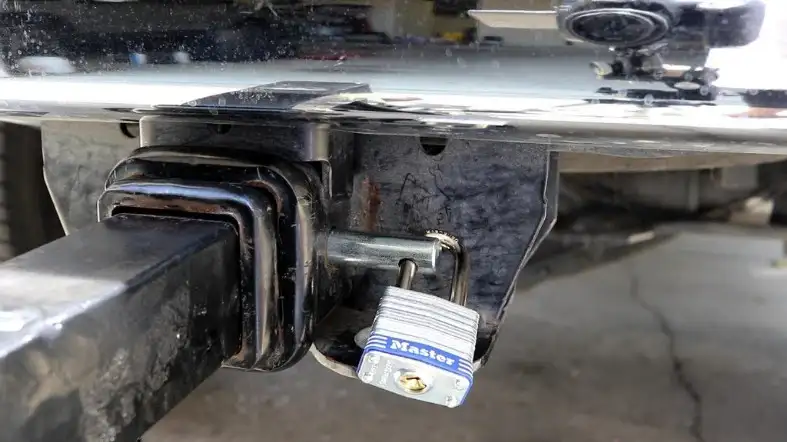
When you’re looking to secure your trailer to your vehicle, it’s essential to choose the right size locking hitch pin.
Here are some suggestions to help you make the best choice:
- First, consider the weight of your trailer. A heavier trailer will need a sturdier pin, so consider this.
- Next, think about how often you’ll be using the pin. If it’s going to be used regularly, look for a durable option that can withstand wear and tear.
- Finally, pay attention to the hole size in your hitch receiver. This will determine the diameter of the pin you need.
With these factors in mind, you’ll be able to choose the perfect locking hitch pin for your needs.
What Are Some Common Mistakes When Using A Locking Hitch Pin?
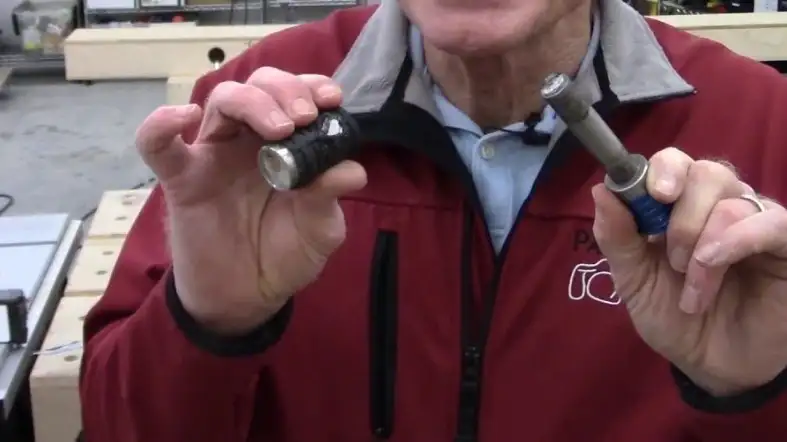
The most common fault people make when using a locking hitch pin is needing to be appropriately securing it.
If the locking hitch pin is not properly secured, it can become loose and fall out, which can cause damage to your vehicle or trailer.
Always make sure that the locking hitch pin is securely fastened before driving.
Forgetting to remove the lock
Another common mistake is forgetting to remove the locking hitch pin before disconnecting the trailer from the vehicle.
This can damage the locking mechanism and make it difficult to reattach the trailer.
Permanently remove the locking hitch pin before disconnecting the trailer.
Looseness of the pin
If you are having problems with your locking hitch pin, check to see if it is adequately secured.
If not, try tightening it or replacing it with a new one.
If the problem persists, contact a qualified mechanic for assistance.
Wear and tear
You can extend the life of your locking hitch pin by regularly inspecting it for wear and tear.
If you notice any damage, replace the pin immediately.
Always store the pin in a dry, clean place when not in use.
Locking hitch pins are commonly used to secure trailers to vehicles.
They can also secure other types of equipment, such as bicycles, kayaks, and ATVs.
FAQs about the right size locking hitch
How Can I Extend The Life Of The Locking Hitch Pin?
Lubricate your locking hitch pin with a silicon-based or Teflon-based lubricant to help prevent corrosion.
Inspect the lock regularly, and replace it if it shows signs of wear.
Use a locking hitch pin cover to help protect the lock from the elements.
Store your locking hitch pin in a dry, protected place when not in use.
How Can I Troubleshoot Problems With My Locking Hitch Pin?
If your locking hitch pin needs to be fixed, there are a few potential solutions.
Confirm that the pin is the appropriate size for your hitch- if it’s too small, it will only be able to grip the hitch securely and may come loose.
If not, push the locking mechanism back into its rightful position.
Lastly, you may need to buy a new Hitch Pin if none of these methods proves effective.
What Size Locking Hitch Pin Do I Need?
As a general rule of thumb, it is always good to err on caution and choose a hitch pin slightly larger than what you need.
It will ensure that your hitch pin is up to the task and will not fail or break under pressure.
The bottom lines
As you can see, there are some factors to consider when determining what size locking hitch pin you need.
You may need a larger pin if you have a big trailer or loads.
Conversely, you may get away with a smaller pin if you have a smaller trailer or lighter loads.
Choosing the right size hitch pin for your needs is vital to ensure safe and secure towing.
